Preserve Your Audio Memories
Cassette To Digital Transfer in Kansas City, MO
Cassette to digital conversion in Kansas City saves family recordings, music mixes, and interviews from tape deterioration. We transfer your audio to modern formats so you can play them on any device. Most projects finish within 5-7 business days. Professional transfer protects quality better than DIY methods that can damage fragile tape.
Cassette Tapes Deteriorate After 15-30 Years Depending on Storage
Your cassette tapes have a limited lifespan. Magnetic tape breaks down faster in Kansas City's humid summers. The oxide layer that holds your audio flakes off over time. Tapes stored in basements or garages fail even faster.
You might notice these warning signs. The sound becomes muffled or distorted. You hear dropouts where audio disappears completely. The tape feels sticky or sheds brown dust when you play it. Some tapes won't play at all because the magnetic coating separated from the plastic base.
Families in Waldo and Prairie Village often find boxes of 1980s and 90s home recordings. These tapes hold interviews, concert bootlegs, and family moments you can't replace. Once the binder that holds the magnetic particles breaks down, your audio is gone forever. We can still transfer tapes that show early wear, but waiting another five years may be too late.
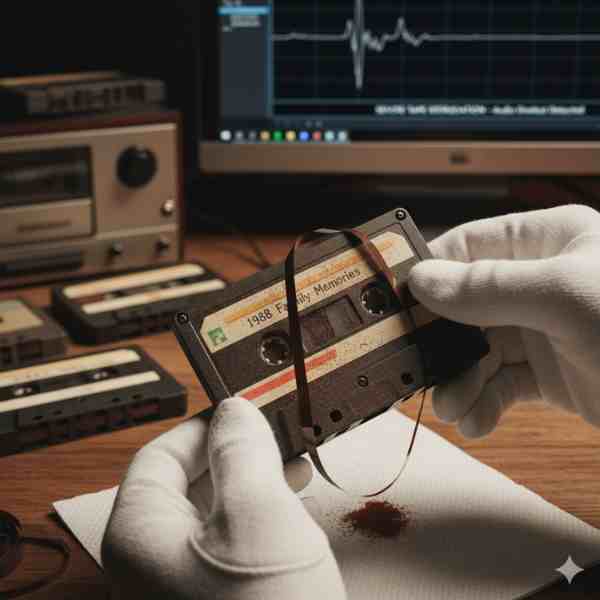
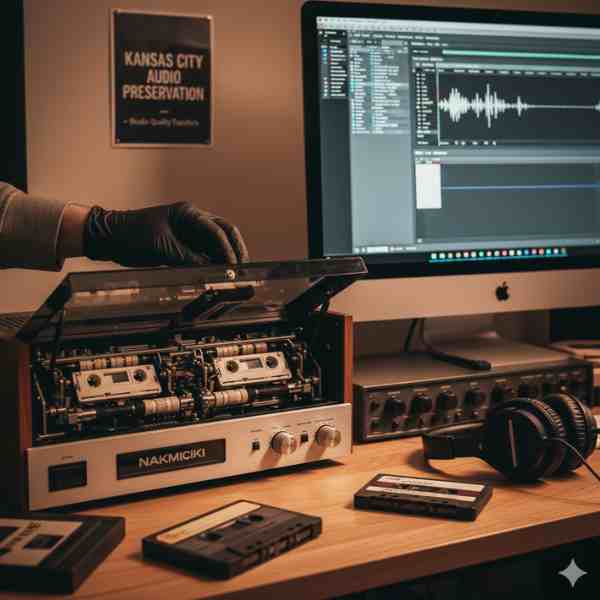
The Best Cassette Digitization Uses Dual-Capstan Decks and Noise Reduction
Professional cassette digitization relies on quality playback equipment. We use dual-capstan decks that keep tape tension consistent. This reduces wow and flutter that makes music sound warbled. These decks also have azimuth adjustment so high frequencies stay clear and detailed.
DIY USB converters sold in Kansas City electronics stores lack these features. They use cheap playback heads that can't align properly with your tape. The result is muffled highs and inconsistent speed. You might save money upfront, but you lose audio detail you can never recover.
Music collectors in the West Bottoms and Crossroads need studio-quality transfers. Rare mixes and live recordings deserve proper playback. We also apply noise reduction after capture to remove tape hiss without damaging the original signal. Your digital files sound as good as the tape allows.
Converting Cassettes to WAV or FLAC Preserves Maximum Audio Detail
You have format choices when we digitize your cassettes. WAV and FLAC are lossless formats that capture the full frequency range. They preserve every detail for future re-mastering or editing. Archivists and families use these formats for irreplaceable recordings like wedding vows or grandparent stories.
MP3 files work better for everyday playback. They take less space on your phone or car stereo. A 320 kbps MP3 sounds excellent for most listeners. You lose some high-frequency detail, but the file size drops to about one-tenth of WAV.
WAV files require more USB or cloud storage. A 60-minute cassette becomes roughly 600 MB as WAV. Kansas City broadband makes cloud backup easy, so storage is less of a concern. We can provide both formats if you want archival copies and portable versions. You choose what fits your needs and equipment.
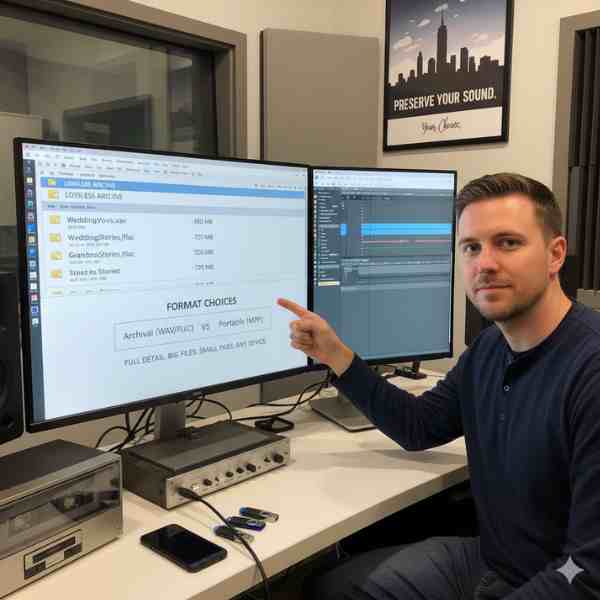
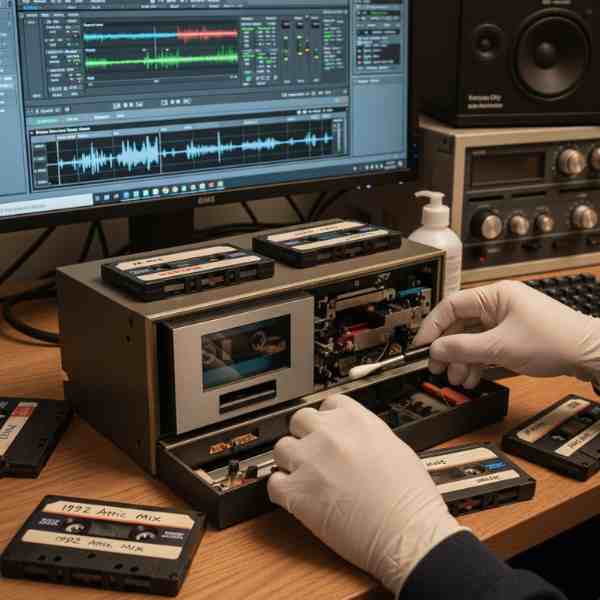
Professional Conversion Improves Sound Through Cleaning and Calibration
We prepare your tapes before any audio duplication service begins. Our process starts with cleaning the playback heads to remove dust and oxide buildup. Tapes stored in Kansas City attics collect dust that clogs heads and muffles treble. We also demagnetize the heads so magnetic residue doesn't color the sound.
Next, we calibrate playback EQ to match the tape type. Chrome and metal tapes need different settings than standard ferric tape. This step brings back clarity that home players often miss. We check tape speed and adjust if needed so music plays at the correct pitch.
You should have realistic expectations for worn tapes. We can reduce hiss and improve clarity, but we cannot restore detail already lost to tape wear. If the oxide layer shed or the tape stretched, that audio is gone. Professional transfer gives you the best possible result from what remains on the tape.
Digitizing Cassettes Takes 2–7 Days for Most Kansas City Collections
Standard turnaround for cassette to digital conversion is 5–7 business days. We process tapes in the order we receive them. Smaller projects with one to five tapes often finish faster. Larger collections with 20 or more tapes may take the full week.
Several factors affect how quickly we complete your project. Tape condition matters—worn or damaged tapes need extra care and slower playback speeds. Format selection also plays a role. WAV files take longer to process and transfer than MP3. Rush service is available for an extra cost if you need files sooner.
Families in Lee's Summit and Overland Park often digitize tapes before moves or estate cleanouts. Planning ahead gives you digital copies before you pack or donate equipment. Holiday seasons in Kansas City extend wait times. Graduation and Christmas bring more orders, so book early during May and November.
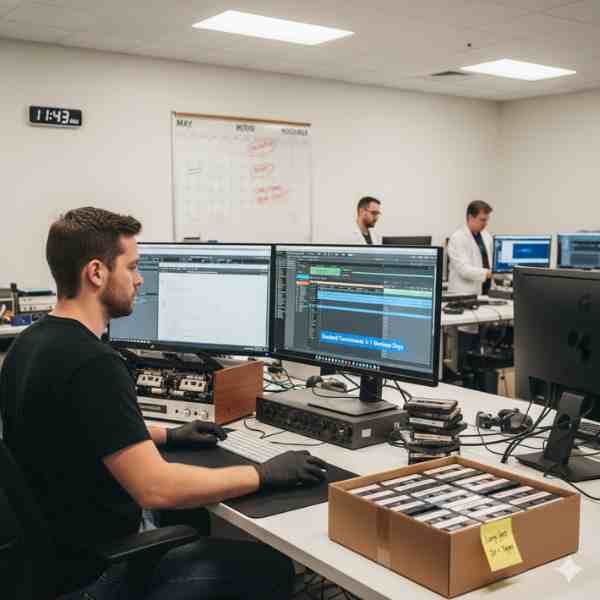
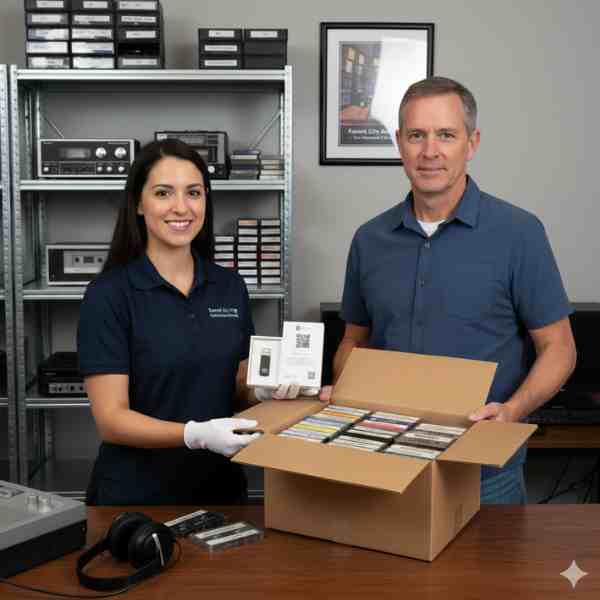
You Keep Your Original Cassette Tapes After Digital Transfer
We return your original cassette tapes along with your digital files. Most collectors want physical media plus digital backup. Your tapes come back in their original cases with labels intact. Audio duplication services in the Plaza and Midtown areas follow this standard practice.
You receive your digital files on a USB drive or through a download link. The USB option works well if you prefer physical delivery. Downloads let you access files immediately once processing finishes. Both methods give you the same audio quality.
Store your original cassettes in a cool, dry space after conversion. Kansas City humidity damages tapes over time, so avoid basements and garages. Keep them away from direct sunlight and heat sources. Even though you have digital copies, proper storage protects the originals if you ever need them again.
What is the best way to digitize cassette tapes in Kansas City?
The best way to digitize cassette tapes in Kansas City is to use a professional audio duplication service with proper playback equipment and follow these steps:
Gather all cassette tapes and note which ones have sentimental or rare content
Choose an audio duplication service in Kansas City with professional playback decks
Select your digital format—WAV for archiving or MP3 for everyday listening
Drop off tapes or schedule pickup in neighborhoods like Westport or Brookside
Service cleans tape heads and calibrates equipment before transfer
Receive digital files on USB drive or via download within one week
Store original cassettes in cool, dry space away from Kansas City humidity
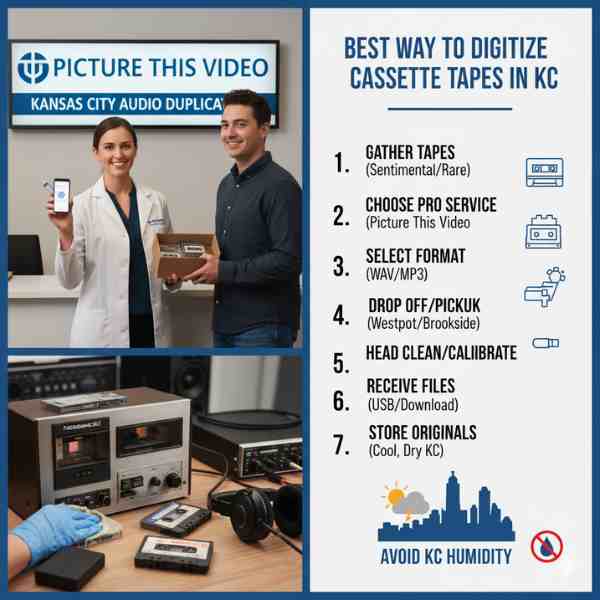
Cassette To Digital Transfer FAQ
Where can I get cassette tapes converted in Kansas City?
You can get cassette tapes converted through audio duplication service providers such as Picture This Video in Belton, or online services with local pickup and drop-off options.
How long does cassette to digital conversion take in Kansas City?
Cassette to digital conversion in Kansas City takes 5–7 business days for most standard orders. Rush options are available for an extra cost if you need files sooner.
Will converting my old cassette tapes improve the sound quality?
Professional transfer cleans and calibrates playback to reduce noise, but it cannot restore detail already lost to tape wear.
What happens to my cassette tapes after they're digitized?
Your cassette tapes return to you along with digital files on USB or download. Reputable Kansas City audio duplication services label and return tapes in their original cases.
Should I digitize cassette tapes or just throw them away?
You should digitize any tape with family recordings, rare music, or sentimental value. Kansas City humidity will destroy tapes within years, making the audio unrecoverable.
What digital format is best for converting cassette tapes?
WAV or FLAC is best for archiving full quality. MP3 at 320 kbps works well for everyday playback on your phone or car stereo.

Don't wait for your old 8mm film, slides or VHS tapes to fade away. Call or contact Picture This Video Inc now for a free estimate and quick, reliable service.
Monday - Friday: 8am - 5pm
Saturday & Sunday: Closed
Powered By Local Biz Domination
